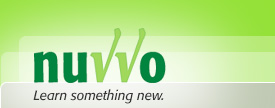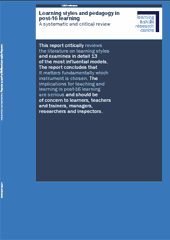Leading Innovation in Global Education & Training
 The 2006 Lisbon Conference brings together Business Educators, Academics, and Professionals in the fields of Education, HR, Training and Development to exchange ideas and knowledge about innovative learning practices in business education and training for global business change. Details
The 2006 Lisbon Conference brings together Business Educators, Academics, and Professionals in the fields of Education, HR, Training and Development to exchange ideas and knowledge about innovative learning practices in business education and training for global business change. Details [
here]
ECAR study of students and information technology, 2005.
ECAR study of students and information technology, 2005. Convenience, connection, control and learning.
Suggests that asking the next generation of students about IT in learning is like asking a fish to describe water! i.e. it is such an integral part of the environment that it seems so obvious... they will be here soon!
134 page PDF [
here]
Networked Learning and Blackboard?
I found this interesting paper written by the CEO of BlackBoard. The white paper suggests:"A Networked Learning Environment in the Internet age applies new technology to a very old concept— that learning is much more than classes and grades. It is about the learning that takes place in a vibrant community of people and resources. The Internet has removed the limits of time and proximity that once restricted this community. In a true Networked Learning Environment, any student, instructor or researcher can access any learning resource at anytime from anyplace"There is a a bit of a sales pitch for Blackboard but makes the point that networked learning is more that just online courses... and involves people being able to access and contribute ideas and learning materials anywhere, anytime. Access it [here]
Was Web 1.0 the right boat to catch?
 I just emailed (so last year!) a colleague in our exec development unit to request some information on Blooms taxonomy of educational outcomes. I received a polite reply saying that she was 'out of the office until Monday'. Luckily I found what I needed via Wikipedia... As users become more familiar with online resources, Web2.0 tools, etc. resources like Wikis will become increasingly utilized.
I just emailed (so last year!) a colleague in our exec development unit to request some information on Blooms taxonomy of educational outcomes. I received a polite reply saying that she was 'out of the office until Monday'. Luckily I found what I needed via Wikipedia... As users become more familiar with online resources, Web2.0 tools, etc. resources like Wikis will become increasingly utilized.
Bloglines
 Create a personal Bloglines page loaded with the freshest news about the things you love. [here]
Create a personal Bloglines page loaded with the freshest news about the things you love. [here]
IPOD in education
 This must be worth a look
This must be worth a look
Youtube
 Another web 2.0 concept. This time it is shared video! [here]
Another web 2.0 concept. This time it is shared video! [here]
Longroadmedia
This is a site from a sixth-form college, in Cambridge who have developed a subject-based blog to provide up-to-date information and commentary on their subject area, as well as posting questions and assignments, and linking to relevant news stories and websites. It is run by a guy called Pete Fraser. Visit [here]
Seconds out, round two
 The explosion of new web services - such as 'blogs' and 'wikis' - has led many to believe that the internet is now entering a second phase. It's finally beginning to resemble a truly interactive learning tool, says Stephen O'Hear [here]
The explosion of new web services - such as 'blogs' and 'wikis' - has led many to believe that the internet is now entering a second phase. It's finally beginning to resemble a truly interactive learning tool, says Stephen O'Hear [here]
Journal of Learning Design
 Edited by Allison Brown of QUT, who we met last week in Houston, the website says "The Journal of Learning Design (JLD) is a bi-annual, refereed journal which is issued in February and July. It is a venue for the dissemination of valuable and significant works by educational and training practitioners that have resulted in enhanced learning outcomes for students. Manuscripts are refereed by at least two reviewers from the Editorial Board, Review Panel or International Reference Panel". Have a look [here]
Edited by Allison Brown of QUT, who we met last week in Houston, the website says "The Journal of Learning Design (JLD) is a bi-annual, refereed journal which is issued in February and July. It is a venue for the dissemination of valuable and significant works by educational and training practitioners that have resulted in enhanced learning outcomes for students. Manuscripts are refereed by at least two reviewers from the Editorial Board, Review Panel or International Reference Panel". Have a look [here]
Nuvvo - free LMS
 I was talking to Gerry last week and he recommends this... "Nuvvo is your way to teach on the web. Everyone knows a little bit about something, and this free, AJAX-enhanced eLearning web service is designed to bring out the teacher in all of us. Sign up and build a course in minutes; advertise your course on our eLearning Market to get the word out. Get teaching with Nuvvo, Web 2.0's answer to eLearning".[link]
I was talking to Gerry last week and he recommends this... "Nuvvo is your way to teach on the web. Everyone knows a little bit about something, and this free, AJAX-enhanced eLearning web service is designed to bring out the teacher in all of us. Sign up and build a course in minutes; advertise your course on our eLearning Market to get the word out. Get teaching with Nuvvo, Web 2.0's answer to eLearning".[link]
Real-Time Collaboration
Remarks by Bill Gates, Chairman and Chief Software Architect, Microsoft Corporation Real-Time Collaboration Web Conference, San Francisco, CaliforniaMarch 8, 2005. [link]
Betty Collis
Betty Collis and Jef Moonen are specialists in learning involving information and communication technologies. They have a cult following with the learning designers that we met last week. There website is [here]
Flash Lite
Flash Lite has seen explosive adoption by OEMs, operators, and developers in Japan and Asia, and now it's quickly growing worldwide. Read a paper by Bill Perry [here]
This is now - 10 x 10
Every hour, 10x10 scans the RSS feeds of several leading international news sources, and performs an elaborate process of weighted linguistic analysis on the text contained in their top news stories. After this process, conclusions are automatically drawn about the hour's most important words. The top 100 words are chosen, along with 100 corresponding images, culled from the source news stories. At the end of each day, month, and year, 10x10 looks back through its archives to conclude the top 100 words for the given time period. In this way, a constantly evolving record of our world is formed, based on prominent world events, without any human input.10x10 is designed to be simple and intuitive, so you should find it easy to use. When you open 10x10, you will see a grid of the top 100 world images that hour, ranked in order of importance, reading left to right, top to bottom. Along the right edge of the screen are listed the corresponding top 100 words, one for each image
86,800 most frequently used words...
WordCount™ is an artistic experiment in the way we use language. It presents the 86,800 most frequently used English words, ranked in order of commonness. Each word is scaled to reflect its frequency relative to the words that precede and follow it, giving a visual barometer of relevance. The larger the word, the more we use it. The smaller the word, the more uncommon it is.WordCount data currently comes from the British National Corpus®, a 100 million word collection of samples of written and spoken language from a wide range of sources, designed to represent an accurate cross-section of current English usage. WordCount includes all words that occur at least twice in the BNC®. In the future, WordCount will be modified to track word usage within any desired text, website, and eventually the entire Internet.
Swicki
Have you seen Swicki - look to the right of the page. It is a search engine that learns from the search behavior of your community. It is free. This may prove to be extremely valuable.
Frappr
Have a look at Frappr - another web 2.0 idea? You can create a map for your group and see where everybody is located. Take a look at Frappr 
Learning styles and pedagogy in post-16 learning
 I have been doing a lot of work on systematic review / evidence-based practice and recently found this document which might be of interest: Learning styles and pedagogy in post-16 learning: A systematic and critical review
I have been doing a lot of work on systematic review / evidence-based practice and recently found this document which might be of interest: Learning styles and pedagogy in post-16 learning: A systematic and critical review
The report "critically reviews the literature on learning styles and examines in detail 13 of the most influential models. The report concludes that it matters fundamentally which instrument is chosen. The implications for teaching and learning in post-16 learning are serious and should be of concern to learners, teachers and trainers, managers, researchers and inspectors". You can download a PDF here










